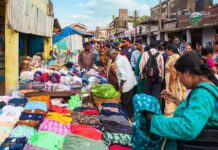Pradeep Kumar Panda
The novel coronavirus disease aka COVID19 pandemic has brought to light significant health inequities that have existed in our society for decades. Poorest of poor and migrant laborers are the communities most likely to experience disparities related to the burden of disease, health care, and health outcomes. There has never been a more pressing time for us to enact progressive and far-reaching changes in social, economic, and political policies that will shape programs aimed at improving the health of all people living in India.
 Recently, a national program known as Ayushman Bharat (Prime Minister Jan Aarogya Yojana) was initiated by the Government of India. The goal is to improve the health of all people living in India. Largely based on egalitarian principles, this initiative seeks to reduce disparities and achieve the highest level of health for all groups. It appears that now may be a good time for us to assess our national response to managing the COVID19 pandemic in light of this initiative.
Recently, a national program known as Ayushman Bharat (Prime Minister Jan Aarogya Yojana) was initiated by the Government of India. The goal is to improve the health of all people living in India. Largely based on egalitarian principles, this initiative seeks to reduce disparities and achieve the highest level of health for all groups. It appears that now may be a good time for us to assess our national response to managing the COVID19 pandemic in light of this initiative.
We recognize that the COVID19 pandemic has exposed many inadequacies in health care, particularly our capacity to adequately handle a public health emergency. Infrastructure shortfalls, reporting limitations, distribution and access to COVID19 screening tests, inconsistencies in the dissemination of factual real-time information, and inadequate provision of resources such as personal protective equipment to overburdened hospitals and health care workers are only a few of the problems compounding the adverse effects of this pandemic on the health and welfare of our nation.
 However, one of the biggest problems the coronavirus has clearly illuminated is the wide range of inequities in our nation’s approach to health care. These have only become more transparent throughout the COVID19 crisis. What we are experiencing on a daily basis from the COVID19 outbreak is an even stronger divide in health equity. It was not until after concerted urging by several lawmakers did governmental agencies begin collecting demographic data pertaining to race and ethnicity of individuals being tested and treated for COVID19.
However, one of the biggest problems the coronavirus has clearly illuminated is the wide range of inequities in our nation’s approach to health care. These have only become more transparent throughout the COVID19 crisis. What we are experiencing on a daily basis from the COVID19 outbreak is an even stronger divide in health equity. It was not until after concerted urging by several lawmakers did governmental agencies begin collecting demographic data pertaining to race and ethnicity of individuals being tested and treated for COVID19.
Early reporting on confirmed COVID19 hospitalized patients in Kerala, Maharashtra, Tamil Nadu and Delhi revealed there were disproportionately higher rates for poor and marginalized community members. Reports from cities across India that have been most severely affected by the virus have uncovered glaring disparities. The perceived inequities in health expressed by many minority groups in India are real and pervasive. To begin to address this problem, we need to better understand what is at the heart of these inequalities. The conditions in which we live our daily lives play a significant impact on our health and well-being.

It is well known that social determinants such as poverty, high-crime neighborhoods, poor access to healthy food, limited education and skill level, and high unemployment adversely affect health increasing the risk for diseases such as cardiovascular disease, diabetes, asthma, and now COVID19. However, this problem of health inequities goes beyond just social and environmental conditions and extends into health care systems. A recent study published in Science identified racial bias in an algorithm with widespread use in large health care systems throughout India.
The algorithm was designed to target patients with complex health needs for ‘‘high-risk’’ management programs designed to provide greater resources and supportive care to improve health outcomes. It was found out that even within these large health care systems, structural biases can further perpetuate health inequity. No geographic area or medical specialty, including otolaryngology, is immune to these inequities.
 Regions with many having lower socioeconomic status, we see a higher incidence of individuals with advanced head and neck cancer entering the health care system for their initial workup. This is in part due to the number of uninsured and undocumented individuals living in the area who have limited access to health services. If we are to truly recover as a nation from the grave consequences of this pandemic, we will need to address the larger issues concerning inequities in health for many groups in our country based on decades of inequalities.
Regions with many having lower socioeconomic status, we see a higher incidence of individuals with advanced head and neck cancer entering the health care system for their initial workup. This is in part due to the number of uninsured and undocumented individuals living in the area who have limited access to health services. If we are to truly recover as a nation from the grave consequences of this pandemic, we will need to address the larger issues concerning inequities in health for many groups in our country based on decades of inequalities.
This will involve influencing changes in social, economic, and political decisions and policies that shape national programs affecting our health. Although this is a national issue and may seem to be overwhelming to tackle, making small steps can yield great benefits. We can all be part of the solution to achieve health in all people by beginning in our own communities, our own hospitals, and our own practices. Building a stronger India involves creating a healthier society for all.
(Author is a New Delhi based Economist. Views are Personal)



























